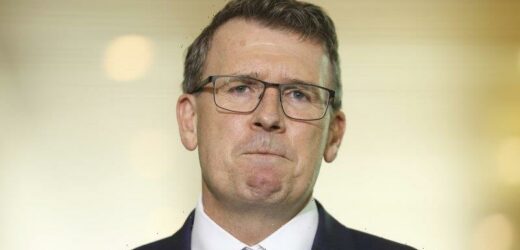Former Liberal human services minister Alan Tudge says he knew the robo-debt scheme produced inaccurate results from early 2017 but that its legality hadn’t even occurred to him until years later.
Tudge, who in 2016 and 2017 was responsible for administering the welfare crackdown that illegally used income averaging to calculate debts, told a royal commission hearing he would have expected to be warned about the program’s unlawfulness, insisting that wasn’t his personal failure.
“It just had not crossed my mind until I read it in the newspaper, I think following the Federal Court case,” he said of the scheme’s legality.
Former Coalition human services minister Alan Tudge has been grilled over his involvement in the robo-debt scheme.Credit: Alex Ellinghausen
A Federal Court judge found in 2019 that income averaging – the method used to calculate debts of thousands of vulnerable people – was unlawful, a conclusion that had already been reached in legal advice seen by both the departments of human services and social services several years before.
Tudge is the third former Coalition minister to be grilled over the automated debt recovery scheme after former human services minister Marise Payne and former prime minister Scott Morrison, who appeared due to his previous role as social services minister, faced the commission in December.
On Tuesday, Tudge’s former media adviser Rachelle Miller told the commission of how she planned to run stories about dole bludgers and welfare integrity in more sympathetic “right-wing” outlets to combat the “crisis in left-wing media”.
Tudge faced the royal commission into the illegal scheme at a hearing in Brisbane on Wednesday.
Tudge has been repeatedly reported as having threatened criminal action against welfare recipients who didn’t pay their debts during an A Current Affair interview in late 2016, but he told the commission he had been taken out of context as he was speaking about deliberate fraudsters.
“That annoyed me greatly,” he said, however, he acknowledged he could have emphasised the vast majority of welfare overpayments – 99.9 per cent – had no element of fraud.
But he denied the “overlay of fraud” made it more likely people would repay the money.
“There was a strategy to the process,” council assisting the commission, Justin Greggery KC, put to him.
“I’d disagree with that,” Tudge said.
The scheme used Tax Office annual income data and averaged it over 26 fortnights, presuming income was the same across each, and put the onus on welfare recipients to prove they didn’t owe the government money.
“I was aware the system through the data matching process had the potential to create inaccuracies and I was aware of that in January [2017],” he said.
“It had potential to not be a perfect surrogate of what their income was.”
The commission heard that top bureaucrats and lawyers within his department, including the former secretary Kathryn Campbell and chief legal counsel Annette Musolino, went to a legal conference in June 2017 at which eminent barrister Peter Hanks KC warned the program was potentially illegal.
Tudge said he would have expected to be notified by Campbell or other senior bureaucrats if they had learned of legal issues relating to the scheme, agreeing it would’ve been a failing within the department for him not to have been told.
“A failure for which you are responsible for as the minister,” Greggery put to him.
“I don’t know that you can say that,” Tudge replied.
Cut through the noise of federal politics with news, views and expert analysis from Jacqueline Maley. Subscribers can sign up to our weekly Inside Politics newsletter here.
Most Viewed in Politics
From our partners
Source: Read Full Article




